If you’re curious about boondocking in your RV, these RV boondocking tips will help you enjoy a truly independent and natural camping experience. Boondocking is a fantastic way to immerse yourself in nature and disconnect from the usual comforts of RV parks or campgrounds. However, since you’re away from regular hookups, it is essential to be well-prepared. Let’s dive into 47 tips to help you make the most out of your boondocking adventures.
What is RV Boondocking?
RV boondocking, also known as dry camping, involves parking your RV in a location without typical campground amenities like water, sewer, or electrical hookups. It’s a way to enjoy the serenity of nature, often in remote or undeveloped areas, and requires self-sufficiency and preparation to ensure a comfortable experience. This style of camping emphasizes independence and a deeper connection with the outdoors.
RV Boondocking Tips About Food and Cooking
In the realm of boondocking, managing food and cooking can present unique challenges and opportunities. This section delves into practical tips for food storage, preparation, and cooking while boondocking.
1. Pre-wash fruits and veggies
Before setting off on your trip, wash all fruits and vegetables. This not only saves water while boondocking but also ensures you have clean, ready-to-eat produce.
2. Plan to cook one-pot meals to save on dishes
Opt for one-pot meals which are not only efficient and easy to prepare but also significantly reduce the amount of dishwashing needed.
3. Don’t use electric skillets, microwaves, or other high-power-draw kitchen accessories when not using your generator
Conserve your RV’s power supply by avoiding high-power kitchen appliances unless you’re running your generator.
4. Cook outside in hot weather to keep your RV cool
Utilize outdoor cooking methods like grilling or portable stoves in warm weather to prevent heating up your RV’s interior.
5. Fill your propane tank before you head out
Ensure you have a full propane tank before your journey, as it’s essential for cooking and sometimes even for refrigeration while boondocking.
6. Pre-cook and freeze meals ahead of time
Prepare and freeze meals before your trip for easy, quick reheating. This not only saves cooking time but also conserves energy and water resources.
Water Conservation Tips for Boondocking
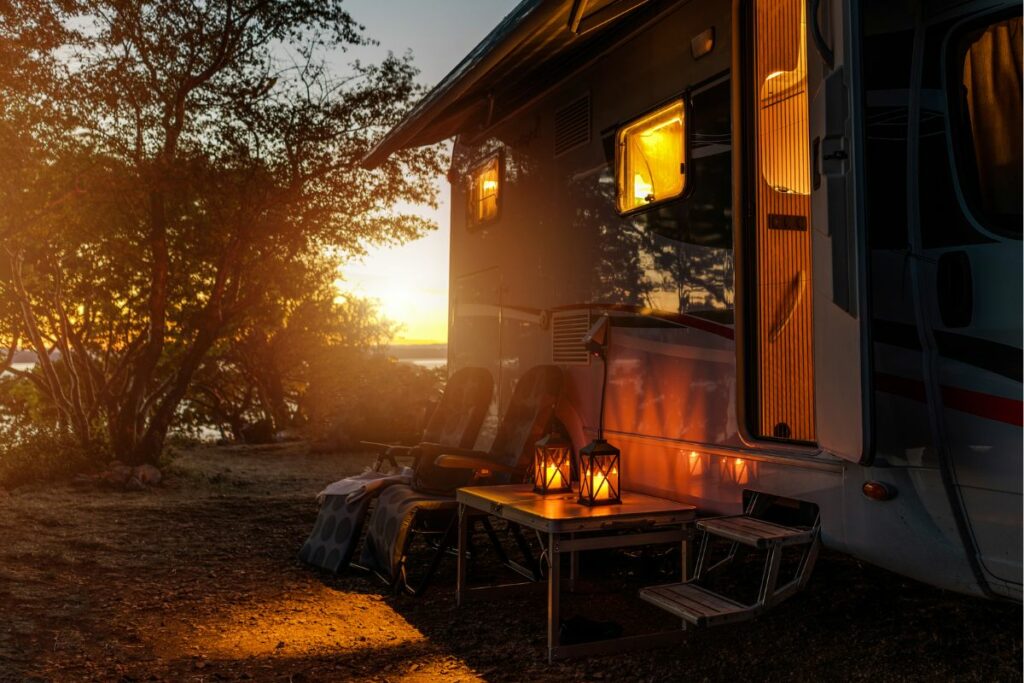
As water is a precious commodity in the boondocking lifestyle, efficient usage and conservation are crucial. In this section, we will explore valuable tips for managing your water supply while boondocking. These strategies cover everything from reducing consumption and reusing water, to innovative ways of sourcing and storing water. Implementing these tips will help ensure you have enough water for the duration of your adventure, while also respecting the natural environment you’re immersed in.
7. Fill up fresh water tank before heading out
Ensure your RV’s fresh water tank is completely filled before your trip to maximize your available water supply while boondocking.
8. Empty black and gray tanks before heading out
Start your journey with empty black and gray water tanks to maximize the capacity for wastewater during your trip.
9. Wipe food off dishes with paper towels to save on washing time
Before washing, use paper towels to remove food from dishes, reducing the amount of water needed for cleaning.
10. Limit dishwashing to once per day
Conserve water by restricting dishwashing to just once a day, compiling all dirty dishes for a single washing session.
11. Wash dishes on a trickle of water
Use only a small trickle of water when washing dishes to significantly decrease water usage.
12. Use a wash basin when washing dishes to catch water
Employ a wash basin for dishwashing to catch and reuse gray water for other purposes like flushing the toilet.
13. Catch clean water while pre-heating shower for other uses
Collect the initial cold water while waiting for the shower to heat up, and use it for tasks like dishwashing or flushing toilets.
14. Use separate drinking water jugs for drinking
Keep dedicated jugs for drinking water to conserve the water in your onboard tanks for daily water needs.
15. Use refillable water bladders to top up on water
Using refillable water bladders allows you to travel to the nearest potable water station to get more water without having to break camp.
16. Take quick navy-style showers
Limit your shower time by taking quick, efficient navy-style showers to drastically reduce water use. This consists of turning the water off while soaping up each body part and only using it when you need to rinse.
17. Use a solar shower outside
Utilize a solar shower outdoors for bathing to save your RV’s water supply and enjoy an outdoor experience.
18. Shower at other places like
Whenever possible, take showers at facilities outside your RV, such as campgrounds or gyms, to conserve your water.
19. Use a portable waste tank to dump without breaking down camp
A portable waste tank allows you to empty your tanks without the need to move your entire setup, conserving both water and effort.
20. Flush less often
Minimize toilet flushing when possible to save significant amounts of water.
21. Swap out your RV toilet with a composting or dry toilet
Using a waterless toilet enables you to conserve your fresh water for longer, which can extend your boondocking trip.
22. Use a water-conserving showerhead
Install a water-conserving showerhead in your RV to reduce the flow and amount of water used per shower.
23. Use paper plates
Opt for paper plates to minimize dishwashing, thereby saving water. Remember to dispose of them responsibly.
24. Practice makes perfect!
Practicing water conservation when you’re not boondocking can help you prepare for your first boondocking trip.
Boondocking Tips for Energy Conservation
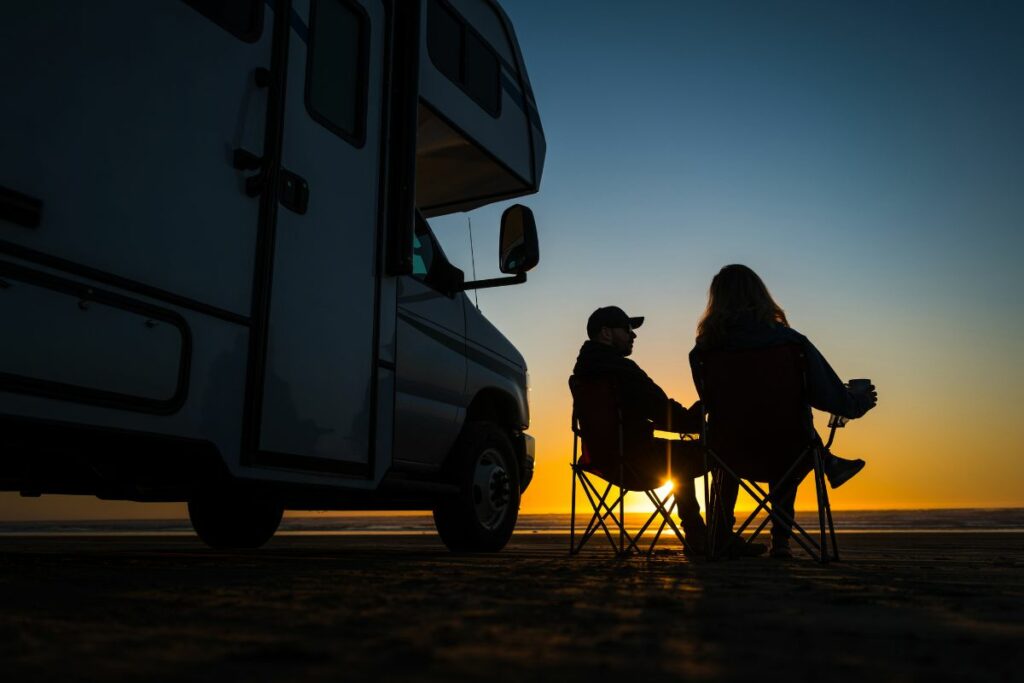
In this section, we’re covering one of the most important aspects that keeps your RV running while boondocking: power.
25. Upgrade to LED lights
Switching to LED lights in your RV reduces energy usage significantly, as they are more efficient and have a longer lifespan compared to traditional bulbs.
26. Unplug everything when not in use
Ensure all appliances and devices are unplugged when not in use to prevent phantom power drain, which can add up over time.
27. Don’t use large power-draw items when not using your generator
Avoid using high-power appliances like air conditioners or microwaves when the generator is off to conserve battery life.
28. Bring extra gas cans for your generator
Carrying extra gas cans for your generator ensures you have a backup power supply, particularly useful during extended stays in remote areas.
29. Use a portable solar generator to charge USB devices
Employ a portable solar generator for charging USB devices, providing a green and efficient energy source while reducing reliance on your RV’s power system.
30. Keep your shades drawn on hot days
Draw the shades on hot days to keep the interior of your RV cooler, reducing the need for air conditioning and saving energy.
31. Use reflective vent and window covers on hot days
Apply reflective covers on vents and windows to deflect sunlight and heat, maintaining a cooler interior environment in your RV.
32. Use a windshield cover for motorhomes in hot weather
A windshield cover for motorhomes can significantly reduce heat buildup inside, decreasing the need for air conditioning. This can also help in winter, as the cab of a motorhome is the least insulated area. You can also consider adding black-out curtains to separate the cab from the rest of the motorhome to help keep heat or cool air inside.
33. Park with purpose to keep your RV cool or warm
Strategically park your RV in shaded areas or in positions that maximize sunlight, depending on weather conditions, to naturally regulate temperature. You can also try to use natural windblocks like bushes in cold climates.
34. Use your awning to shade the side of your RV during the day
Extend your RV’s awning during the day to create shade, lowering the internal temperature and reducing the energy needed for cooling.
35. Open windows at night and use vent fans to draw in cool air
At night, open windows and use vent fans to circulate cool air inside, providing natural cooling without using air conditioning.
36. Upgrade to lithium batteries
Consider upgrading to lithium batteries for their longer lifespan and more efficient power usage compared to traditional lead-acid batteries.
37. Consider adding a solar power system
Installing a solar power system can be a sustainable and cost-effective way to generate electricity for your RV, reducing reliance on generators.
38. Rotate solar panels during the day for the most sun
Adjust the position of your solar panels throughout the day to capture maximum sunlight, optimizing their efficiency and power output.
39. Use low-power-draw heated blankets to keep warm instead of your furnace
Opt for low-power heated blankets as an energy-efficient alternative to running your RV’s furnace for warmth.
40. Use indoor-safe propane heaters to warm up your RV
Indoor-safe propane heaters can be a more energy-efficient option for heating your RV, especially during shorter periods of use.
Garbage and Waste Management RV Boondocking Tips
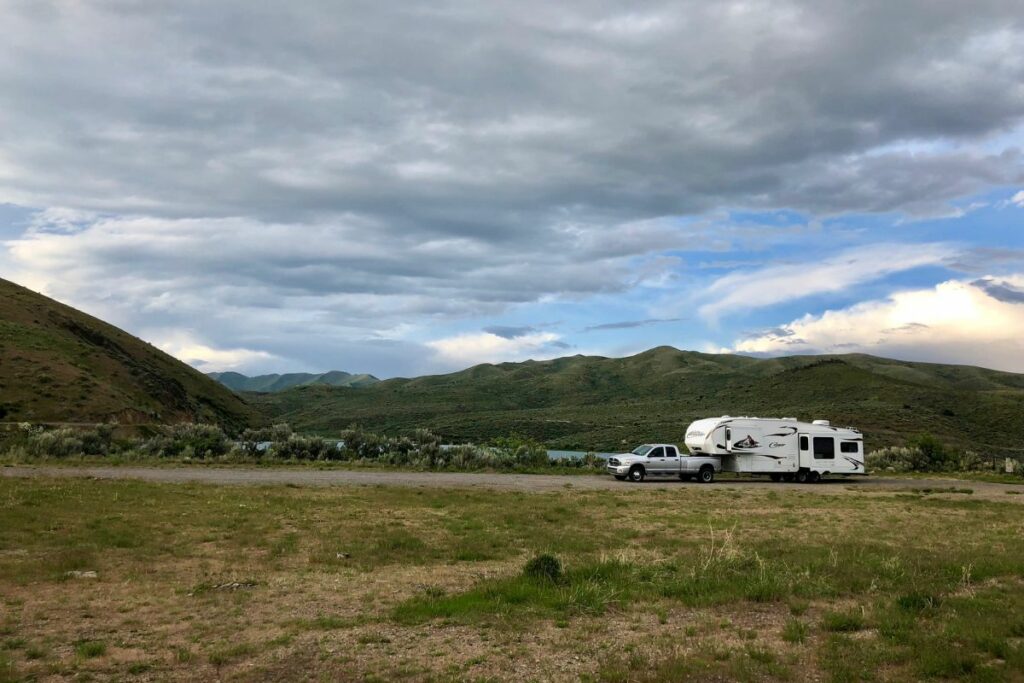
When boondocking in your RV, managing garbage and waste responsibly is not just an environmental imperative, it’s also a matter of courtesy and safety. This section provides essential tips on how to efficiently handle waste, from minimizing garbage production to disposing of it properly. These strategies will help you maintain cleanliness, reduce your environmental impact, and ensure that the natural beauty of your boondocking sites remains unspoiled for future adventurers.
41. Store garbage safely and securely inside
Keep all your garbage stored safely and securely inside your RV to avoid attracting wildlife and to maintain cleanliness around your campsite.
42. Don’t leave any garbage or food outdoors
Ensure no garbage or food items are left outside your RV, as this can attract animals and insects, and it’s also disrespectful to the natural environment.
43. Pack it in, pack it out
Adopt the ‘pack it in, pack it out’ principle by taking all your garbage with you when you leave, ensuring that no trace of your stay is left behind in the wilderness.
44. Burn your non-toxic paper waste in a campfire
Consider burning non-toxic paper waste in a controlled campfire as a way to reduce the amount of garbage you need to carry out, but always do so responsibly and safely. Never burn anything with waxed coatings, rubber, plastic, or any other material besides plain paper or cardboard.
Other Boondocking Tips
In this final section, we delve into a variety of miscellaneous but essential tips that every RV boondocker should know.
45. Give other campers space
Respect the privacy and space of other campers by maintaining a considerate distance from their campsites, ensuring a peaceful experience for everyone.
46. Start with small trips to get the hang of it
Begin your boondocking journey with shorter trips close to home or familiar areas to gradually acclimate to the experience and iron out any kinks in your setup.
47. Try “boondocking” at a campground by not hooking up
Practice boondocking skills at a campground without using the hookups, which can be a great way to prepare for the full off-grid experience in a more controlled environment.

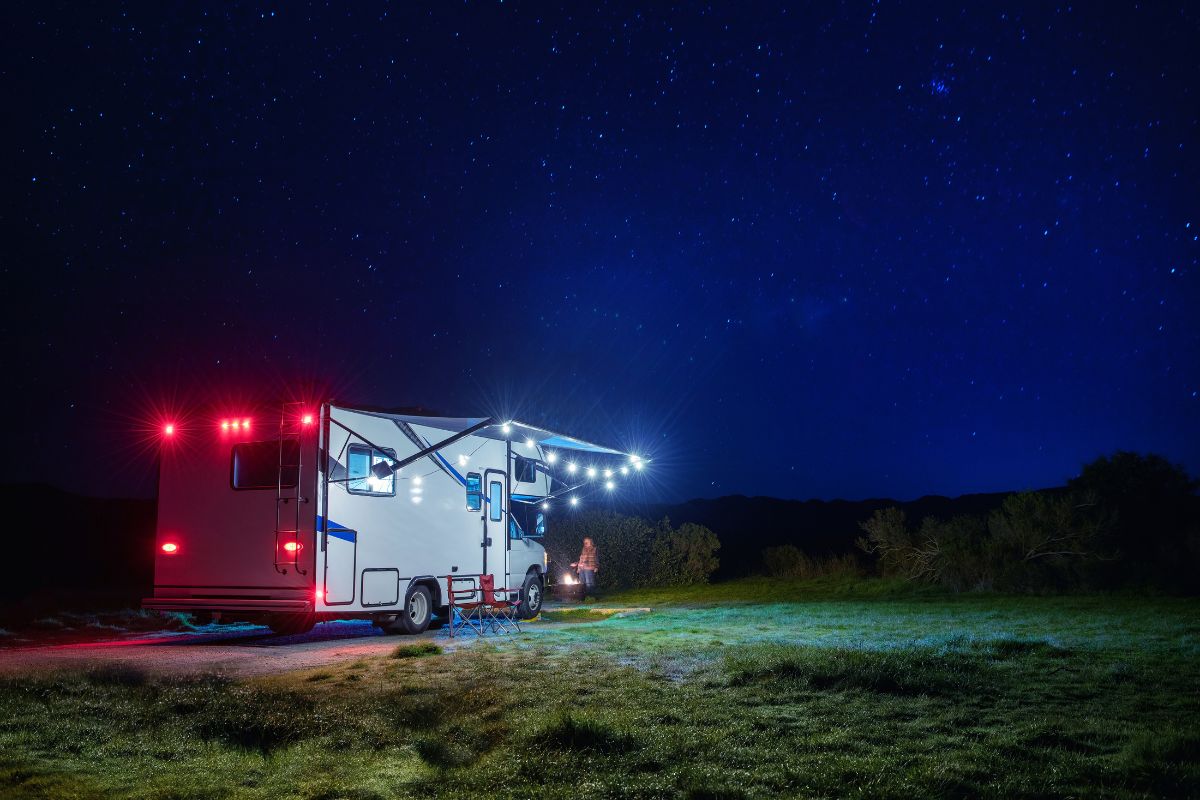
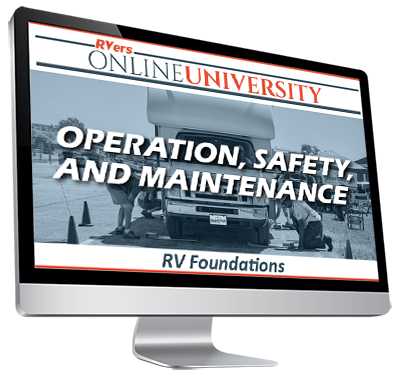


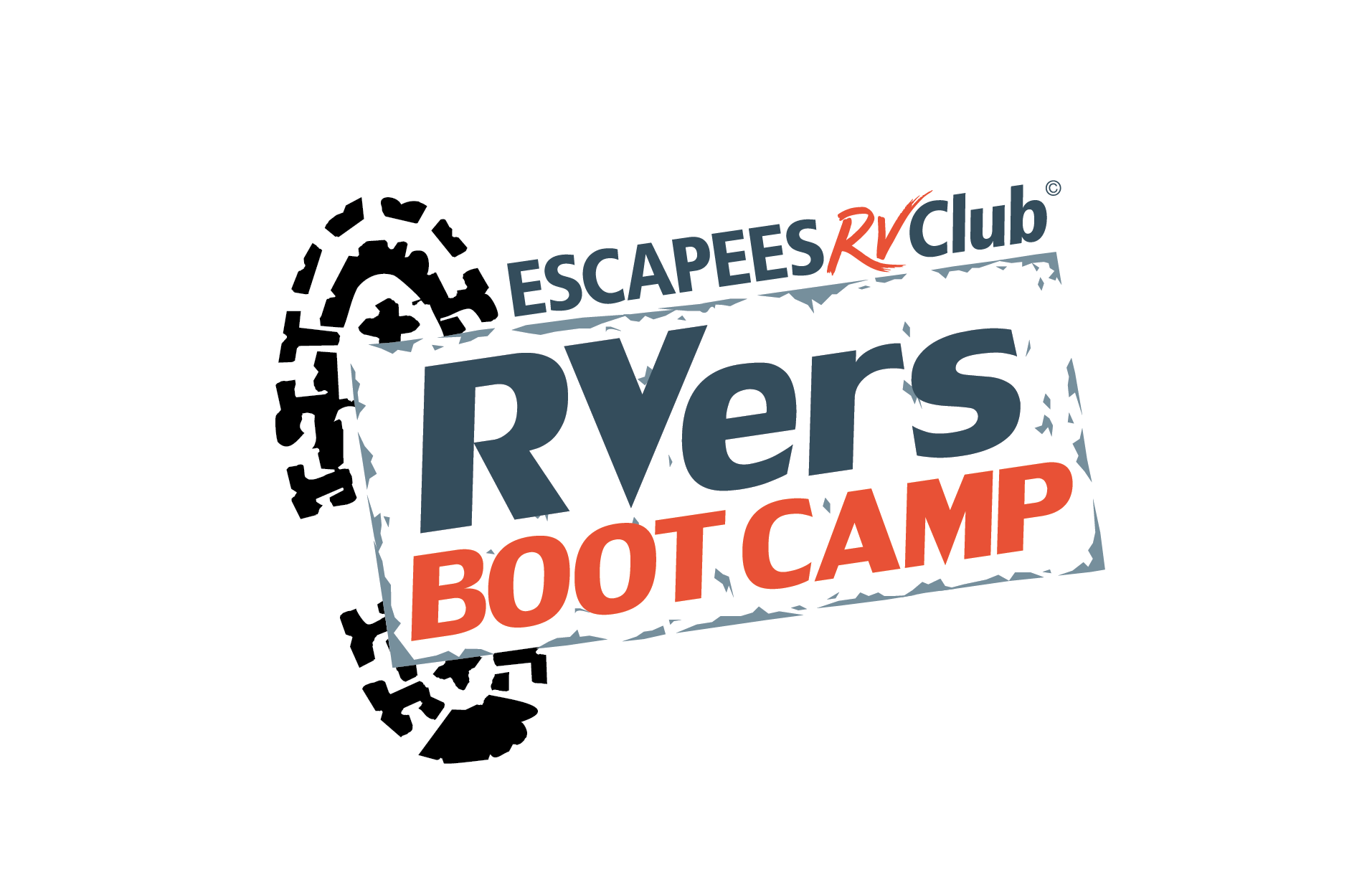



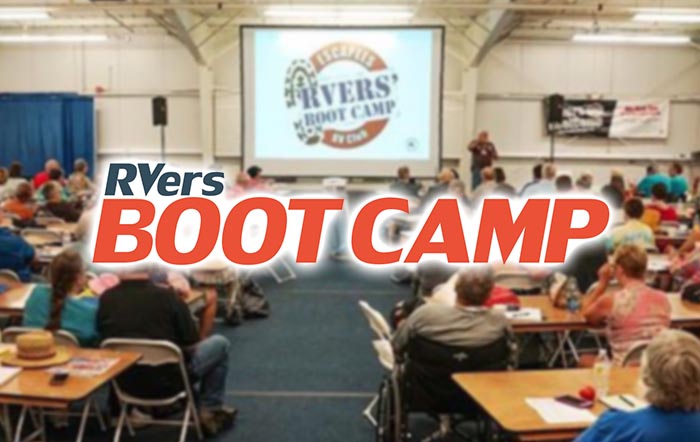
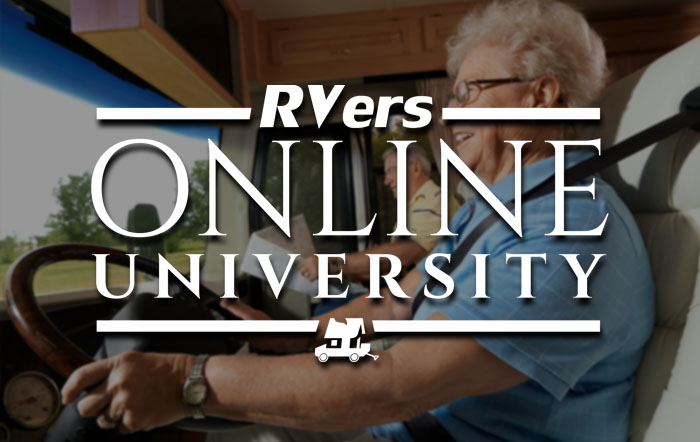

2 Responses
This boondocking information is all very good and very helpful for campers to enjoy national parks and state parks without having to search for an RV campground. Great way to enjoy nature and the outdoors. My wife and I have been practicing these tips for a very long time. To enjoy boondock camping, you just can’t do without these tips.
We’ll build on the dishwashing tips – we primarily cook with cast iron when boondocking, which requires mostly scraping and just a bit of water to clean – no soap, thank you very much. Also a spray bottle of white vinegar mixed with a few drops of Dawn is a great way to ‘start’ the dish cleaning process.